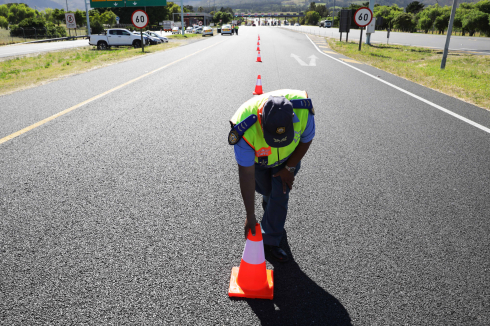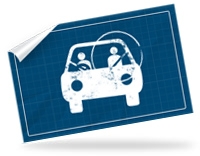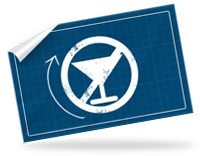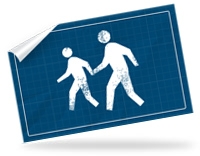Last week, 64 people were arrested by Western Cape Provincial Traffic officers on suspicion of driving under the influence of alcohol. During the same period, 15 pedestrians were killed in traffic crashes in our province.
News
Latest news, speeches, media alerts and publications.

Minister Grant announces launch of Safely Home pedestrian campaign and new fatalities map / 12 November 2014
Pedestrians have made up 44% of the 1,111 road deaths in the province so far this year. Out of the 1,111 deaths, 57% of those which occurred in the City of Cape Town were pedestrians.
This November, Safely Home, in partnership with Sanral and the City of Cape Town, has been highlighting the issue of pedestrian road trauma with a twin road safety campaign:
- #WalkSafe hashtag encourages pedestrians to adopt safer practices, especially not drinking alcohol before walking on roads.
- #SafeRoadsForAll hashtag encourages motorists to adopt more pedestrian-friendly behaviour, such as slowing down, particularly in high pedestrian activity zones. #SafeRoadsForAll has been targeting motorists on the N1, N2 and R300.
We have released a map showing the location of pedestrian fatalities in the Western Cape from 1 January to 31 August 2014. The map can be viewed on our website, safelyhome.westerncape.gov.za/campaigns.
Also on the site are Crash Witness videos, real CCTV footage of pedestrian knockdowns on the freeway network which bring home the reality of the situation. These videos are not for sensitive or young viewers, and can be found here: safelyhome.westerncape.gov.za/galleries/crash-witness-5.
Pedestrian road deaths statistics:
- 582 pedestrians were killed on Western Cape roads in 2013.
- By 23 October, 448 pedestrians had been killed in 2014.
- Pedestrians made up 44% of this year’s death toll so far.
- Most pedestrians are killed in 60 zones.
- Poorer communities are disproportionately represented.
- Black males, aged 20 – 34, are the highest risk demographic.
Freeway hotspots:
- N1 from Brackenfell to Joostenberg Vlakte,
- N2 from Cape Town International Airport to Spine Rd,
- N7 adjacent to Du Noon,
- Vanguard Drive from Masemola Rd to the R300,
- R300 from Vanguard Drive to the N2,
Safely Home will be winding down its Masiqaphele Abantwana Bethu child pedestrian campaign on Radio Zibonele and Umhlobo Wenene FM, and seamlessly replacing it with a new radio campaign targeted specifically at the highest risk pedestrian group in the City: young males who use the roads at night after drinking. We will also be running a new poster campaign on Vanguard Drive and the R300 up to the N2, where 11 pedestrians have already been killed this year. The campaign will run into the Festive Season, when our focus will be on the whole picture of mixing alcohol and road use and the disastrous effects of this. Mabunda et al’s 2007 Research found that:
Alcohol was present in 58% of pedestrian fatalities whose blood was tested.
Alcohol was present in 90% of male pedestrians killed at night.
Pedestrian fatalities are most common between 6pm and midnight.
Pedestrian fatalities increase through the course of the week, peaking on Saturday nights and in the early hours of Sunday morning.
Pedestrian Awareness: How You Can Make a Difference
If you know people, especially young males, who drink regularly, and put themselves at risk by walking across busy roads or freeways, consider speaking to them about this. Hundreds of lives are being wasted each year when young people, mostly men, consume alcohol and then walk on busy roads, freeways or poorly lit rural roads.
If you are a motorist, consider how your actions could save a life. Making the choice to slow down, especially at night around pedestrian knockdown hotspots, means you will have more time to react if a pedestrian does decide to cross dangerously, and in many cases illegally. It also means that, if the worst happens, the impact forces will be lower, and the possibility of the pedestrian’s survival increased, especially on urban roads.
Follow us on Twitter @WCGovSafelyHome for the latest developments in the campaign and top tips and advice on how to avoid either becoming a casualty or causing one.
See below fact sheet for more info on how you can make a difference and help Safely Home and the Western Cape Government make our roads better together.
More News Posts:
-
-
On Saturday, 23 March 2024, the Western Cape Government (WCG) officially launched our Easter road safety campaign for 2024.
-
The Western Cape Government is offering FREE ten-point vehicle checks by qualified examiners from Saturday, 23 March to Thursday, 28 March at venues in Cape Town and Drakenstein.
-
It is with great sadness that I extend my condolences to the loved ones of the ten people – seven adults and three children – who died in a road crash on the N7 between Vanrhynsdorp and Klawer on Sunday 17 March 2024.






